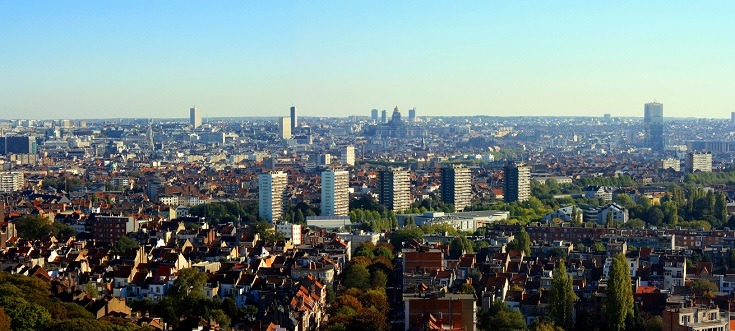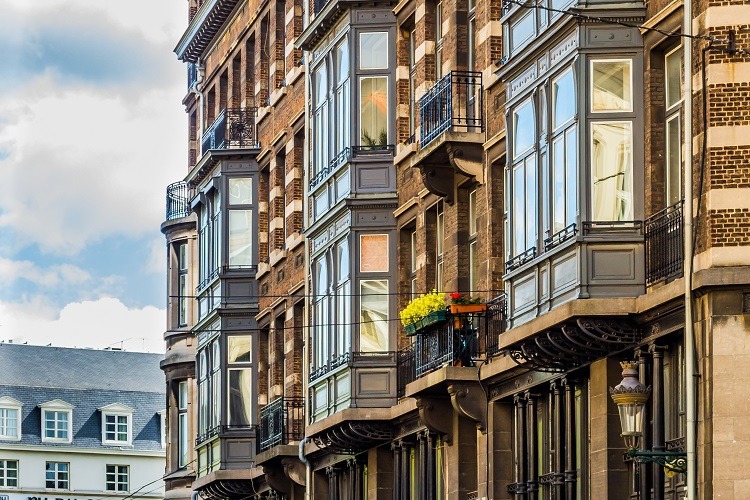Brussels likes to boast that it is Europe’s capital. It has all the trappings of a prosperous, vibrant and comfortable city, with its grand Gothic squares, its cosy brasseries and its lush parks. Yet behind the rich, shiny surface lurks another Brussels that rarely rears its head: a city heaving with poverty, where almost one in three live on the breadline.
The contradictions are stark between the wealth generated in Brussels and the actual living standards for people in the city. Brussels is indeed a city of diplomacy and lobbying, helping make it one of the richest regions in Europe in terms of GDP per capita: only inner London (west) and Luxembourg are better off, according to data from the EU’s statistics agency, Eurostat. Yet amongst the city’s 1.18 million inhabitants, some 30% live below the official poverty line, compared to just 10% in Flanders, 18% in Wallonia and 15% in Belgium overall, according to recent figures from the Brussels-Capital Health and Social Observatory.
Marion Englert, a co-author of the Observatory’s report, says outsiders often miss the contrasts. “We have very high inequalities: the very rich and very poor”, she says. “The overall GDP per person is very high, but it does not do much to help the people in Brussels because half of those who work in the city don’t live there. Half the people who work in Brussels commute from outside the city, with two-thirds coming from Flanders and one third from Wallonia”.
Poverty is measured under European standards as 60% of the median income. In Belgium, the poverty line works out at just €12,993, or €1,083 per month for a single person (€1,732 for a single parent with two children, €2,274 for two parents with two kids). Unemployment benefit, the CPAS/OCMW, is the last net where there is no income, and it is less than the poverty threshold, just €867 for a single person, €578 each for a couple, and €1,156 for a parent with children.
Englert says many measures taken at the federal level exacerbate the situation, like suppressing unemployment benefits (based on studies) for people after three years out of work. “There are things that could be done in Brussels. For example, housing costs are very high, and more social housing could be made available”, she says. Recent measures have failed to reduce poverty, and rather encrusted it, she says. “It could actually get worse, as some people become invisible: they fall off the official statistics. This makes it harder to measure them”, she says.
Not surprisingly, there has been a rise in the numbers of people who come to food banks, and not just the homeless. There has also been a doubling in the past five years in the number on the list for social housing, which is now at more than 45,000 households.
The poverty indices tie together and reinforce one another. For example, 24% of children in Brussels grow up in households without any working income. Amongst adults between 18 and 24, one in six men and one on seven women have left school early without a diploma – and 29% of adults of all ages without secondary school diplomas are unemployed.
There is a wide discrepancy amongst the 19 communes that make up the Brussels city region. Saint-Josse is the smallest and poorest (median income €14 884) and has the youngest population in Belgium and the highest unemployment (28%). By contrast, only 9% of people in Woluwe-Saint-Pierre (median income €25,280) are without jobs.
While 14% children in Brussels schools in first year secondary are two years behind, this figure rises to 27% in Saint-Josse-ten-Noode but is just 4% in Woluwe-Saint-Pierre. Sharp rises in population can put even more pressure on resources: in just ten years between 2005 and 2015, Molenbeek’s population jumped by 22% from 78,520 to 95,576.
This is a picture often missed by international residents, who mostly live in the east and south of Brussels, largely secluded from the rest of the city. But the poorer neighbourhoods are a just short walk from the gleaming sprawl of EU buildings and the leafy suburbs. This chasm between the communities goes some way to explaining how the capital of Europe could have unwittingly nurtured the terrorists behind the Paris and Brussels attacks.
Language is a particularly divisive social indicator. While around 85% of the city’s inhabitants are French-speaking, the capital is officially bilingual. Employers often demand that staff be fluent in both French and Dutch, while English is also essential for jobs linked to the EU, NATO and other international bodies. But these language requirements exclude many of those from immigrant neighbourhoods who often speak Arabic or Turkish as their first language. Research from Organisation for Security and Co-operation in Europe (OSCE) says Belgium has Europe’s lowest proportion of immigrants active on the labour market: it blames racism and discrimination on the one hand, and inequality within the education system on the other.
David Praile, who coordinates the Belgian Anti-Poverty Network (BAPN), urges the authorities to be more generous. “The situation in Brussels is worrying,” he says. “One of the things we ask for in Belgium is to raise the allowances above the poverty threshold. But it’s more than that: the problem of poverty is complex, and can’t be easily resolved. It’s not just about income, it’s about public services, access to education, and access to rights, housing, and mobility.”

Alarming figures from earlier this year show 43% of children in Brussels being born under the poverty threshold. The figures, from a study by the ULB Public Health School, and backed by the King Baudouin Foundation, links poverty to risk factors like single parents or mothers with foreign origins. It found that 70% of children born in Brussels to mothers from sub-Saharan Africa enter life in poverty, a higher proportion than other risk communities like north Africa/Maghreb (65%), eastern Europe (61%) or Turkey (60%). By contrast, the level of poverty of Brussels babies with Belgian origins is 18.3%, comparable to the national average.
Last October, public television channel RTBF broadcast a programme ‘Les Nouveaux Pauvres’ (The New Poor), which argued although it was rich, Brussels had become almost impossible for many young people to live. It showed how surging housing prices, a rapid rise in population without a matching rise in jobs, a hardening of access to social security, and break-ups of one in three families were all helping turn the city into “a poverty factory”.
Isabelle Franck, who works with outreach group Vivre Ensemble, which supports anti-poverty projects across Brussels and Wallonia, says the RTBF broadcast merely confirmed a long-term trend. “We have been talking of ‘the new poor’ for over ten years”, she said. Franck said that Brussels is distinct from other cities, like Paris, in that many of the poor live in the city centre, rather than in the banlieues on the outskirts. “Yes, prices are not as much as in Paris or London, but still average families find it impossible to buy a house in Brussels”, she said.
Frank pointed to the austerity measures introduced by Charles Michel’s centre-right government, which cut billions of euro from the health system, education, assistance for the unemployed. “The system is relatively good compared to, say, the UK. But it is being eroded, and this is the way Europe is going, as we try to balance budgets. For example, there are no longer benefits for young, jobless adults who leave school without diplomas. Education and training is essential so that inequalities are not exacerbated. This is especially important for immigrants, who are much less likely to have higher education qualifications”.
Nicolas De Kuyssche, who runs Le Forum: Bruxelles contre les inégalités (Forum: Brussels against inequality), an umbrella for 50 organisations fighting social exclusion, says talk about the new poor is now so common that it is banal. “We have such high figures of poverty that we can’t talk of social exclusion anymore. These aren’t people on the margins. Everyone from Brussels knows someone who is poor”, he says, pointing to what he calls “the poor crescent”: the north-western communes of Molenbeek, Schaerbeek and St Josse.
De Kuyssche believes that the Brussels system is one of the best in Europe. “Yes, it is very efficient, even if paradoxically the unemployment benefit is less than the poverty threshold figure”, he says. “But it exists. Which is much more than many places have. It offers healthcare. It gives people a path out of poverty. Especially now with the ‘working poor’, the jobs that don’t help people get by. But the benefits have been cut since the start of the 2000s and are now more conditional and more regressive over time”.
Local initiatives have been launched to help the worst off, like the 3,000 homeless people in Brussels, of which 400 to 500 live on the streets, while the others live in shelters. One of them is Housing First Belgium, which addresses homelessness by offering rooms to some of the most vulnerable homeless people who have long histories of living on the streets and physical/mental health problems and/or addiction. The project has rolled out in Brussels city centre and Molenbeek, as well as Antwerp, Ghent, Hasselt, Liège, Charleroi and Namur. Initially backed by the National Lottery, it proved successful enough in June 2016 to qualify for funding from the regional authorities.
Another project is Infirmiers de Rue (Street Nurses), aimed at a sustainable reinsertion of homeless people into homes. This process consists of raising awareness of the importance of hygiene and health, as well as accessing psycho-medic-social help and support, which both have the aim of reconnecting people with themselves and gaining in self-esteem and self-confidence.
These initiatives all help, but they can only alleviate some of the consequences. Unless there is deeper, structural change in Brussels and Belgium, the supposed capital of Europe will be divided by a gulf between its rich and poor.
By Leo Cendrowicz

